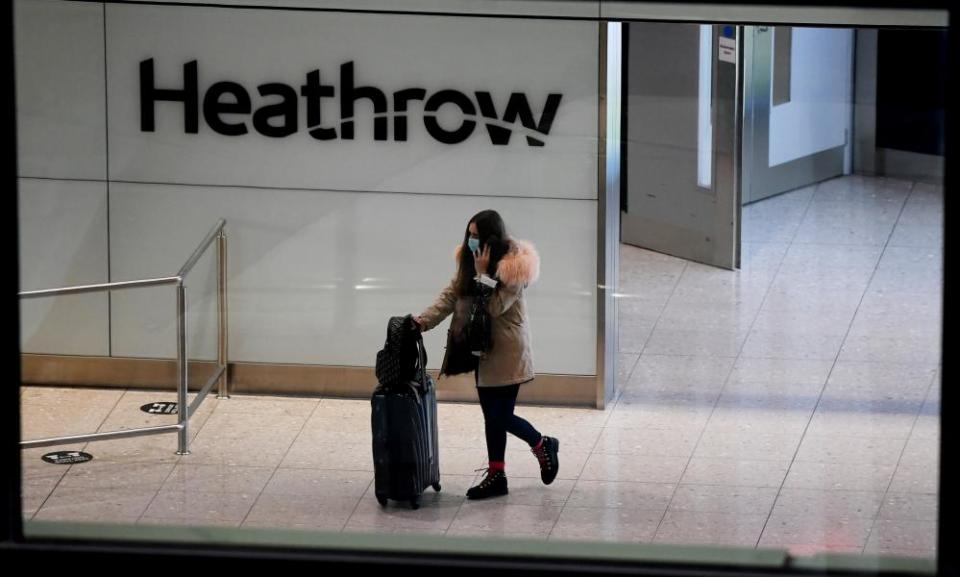Brazil Covid variant in at least 15 countries not on UK's travel red list

The P1 coronavirus variant that originated in Brazil has been found in at least 15 countries that are not on the government’s red list – those from which travel is banned for all but UK residents, who must quarantine in a hotel on arrival for 10 days – it has emerged.
Six cases of P1, which originated in Manaus on the Amazon river in Brazil, have been identified in the UK – three in England and three in Scotland. The variant is worrying scientists and public health experts because it has mutations that could allow it to escape the vaccines currently available.
Five people with the variant are isolating, but the identity of the sixth is unknown. The health secretary, Matt Hancock, told Monday’s Downing Street briefing it was possible that person took a test during a local authority surge – house-to-house testing aimed probably at detecting the variant that originated in South Africa and is similar to P1.
Residents arriving from red-listed Brazil or South Africa would face quarantine in a hotel, while non-residents cannot travel to England at all. In Scotland, all international arrivals are quarantined. The three Scottish cases are residents who flew to Aberdeen from Brazil via Paris and London, according to the Scottish government.
But according to a list compiled by the World Health Organization, P1 has been found in 15 countries that are not on the UK red list. These include Canada and the United States, France, Germany, Spain, Japan, Mexico, India, Italy and the Republic of Korea. Cases have also been detected in six more countries including Ireland and Switzerland, but these are not yet verified, the WHO says.
The WHO report said there were further reports of the variant being found in other countries it was still working on verifying, including China, Croatia, Ireland, Sweden, Switzerland and Turkey.
Hancock said at the briefing that the proportion of cases that were identified as caused by the P1 variant in those countries was “exceptionally low”. The red-listed countries were those where variants were dominant or found in substantial numbers, he said.
But some experts are concerned that the red list may not be adequate to check the flow of variants into the UK. Dr Julian Tang, a virologist and University of Leicester honorary associate professor, said the government’s red list “could go out of date at any time” because of the time it takes to sequence coronavirus cases.
“We saw that Ireland reported three cases of the P1 Brazilian variant about 10 days ago,” he told the Guardian. “It was not surprising to see other imported cases in the UK mainland soon afterwards – and these cases may have already created others here.”
Tang added: “Restricting international travel from red-listed countries may slow down the introduction of new variants from elsewhere, but eventually, such variants will likely spread to non-red-listed countries from red-listed countries – then to the UK from there – if different countries have different red lists.”
Nick Thomas-Symonds, Labour’s shadow home secretary, said the number of countries where variants including the Brazil and South African ones have been discovered that still do not feature on the red list was “significant”.
“UK government action is consistently too little, too late,” he said. “What is needed is a comprehensive hotel quarantine system without delay.”
Prof Lawrence Young, a virologist at Warwick Medical School, said he feared “we might be adding insult to injury by bringing in variants from overseas” that would compound the difficulty of suppressing domestic variants which spring up in the UK.
He warned that while “stringent controls” are in place with the 33 red list countries, that is unlikely to be enough.
“Either you do it all or not it at all,” he said. “Many of us have been concerned all the way through about border control, because we knew during the first and second wave from sequencing the genome that most of the introductions into the UK were from people travelling back from mainland Europe.”
The government’s deputy chief medical officer, Dr Jonathan Van-Tam, made it clear that travel this summer was still in doubt. “We are still in a zone of great uncertainty about what the virus will do next,” he told the briefing.
“On top of that, many of the vaccination programmes in Europe – which is a place where we frequently go on holiday abroad – are running behind ours.
“Clearly, whether we can go on holiday abroad to places such as Europe depends on what other countries will say and do in terms of foreign tourism. There has to be great uncertainty at the moment.”

 Yahoo Finance
Yahoo Finance 